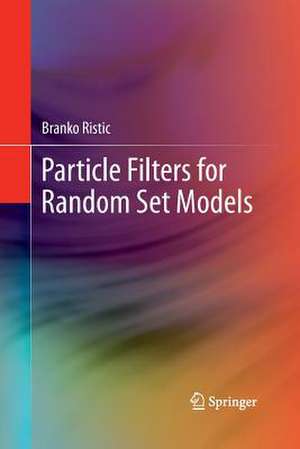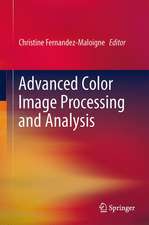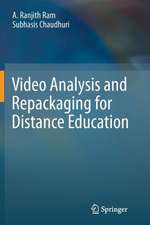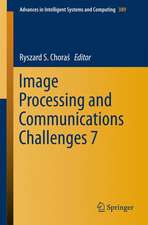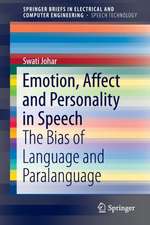Particle Filters for Random Set Models
Autor Branko Risticen Limba Engleză Paperback – 22 mai 2015
| Toate formatele și edițiile | Preț | Express |
|---|---|---|
| Paperback (1) | 885.00 lei 6-8 săpt. | |
| Springer – 22 mai 2015 | 885.00 lei 6-8 săpt. | |
| Hardback (1) | 889.75 lei 6-8 săpt. | |
| Springer – 15 apr 2013 | 889.75 lei 6-8 săpt. |
Preț: 885.00 lei
Preț vechi: 1079.27 lei
-18% Nou
Puncte Express: 1328
Preț estimativ în valută:
169.36€ • 183.91$ • 142.27£
169.36€ • 183.91$ • 142.27£
Carte tipărită la comandă
Livrare economică 23 aprilie-07 mai
Preluare comenzi: 021 569.72.76
Specificații
ISBN-13: 9781489988843
ISBN-10: 148998884X
Pagini: 190
Ilustrații: XIV, 174 p.
Dimensiuni: 155 x 235 x 10 mm
Greutate: 0.27 kg
Ediția:2013
Editura: Springer
Colecția Springer
Locul publicării:New York, NY, United States
ISBN-10: 148998884X
Pagini: 190
Ilustrații: XIV, 174 p.
Dimensiuni: 155 x 235 x 10 mm
Greutate: 0.27 kg
Ediția:2013
Editura: Springer
Colecția Springer
Locul publicării:New York, NY, United States
Cuprins
Introduction.- References.- Background.- A brief review of particle filters.- Online sensor control.- Non-standard measurements.- Imprecise measurements.- Imprecise measurement function.- Uncertain implication rules.- Particle filter implementation.- Applications.- Multiple objects and imperfect detection.- Random finite sets.- Multi-object stochastic filtering.- OSPA metric.- Specialized multi-object filters.- Bernoulli filter.- PHD and CPHD filter.- References.- Applications involving non-standard measurements.- Estimation using imprecise measurement models.- Localization using the received signal strength.- Prediction of an epidemic using syndromic data.- Summary.- Fusion of spatially referring natural language statements.- Language, space and modelling.- An illustrative example.- Classification using imprecise likelihoods.- Modelling.- Classification results.- References.- object particle filters.- Bernoulli particle filters.- Standard Bernoulli particle filters.- Bernoulli box-particle filter.- PHD/CPDH particle filters with adaptive birth intensity.- Extension of the PHD filter.- Extension of the CPHD filter.- Implementation.- A numerical study.- State estimation from PHD/CPHD particle filters.- Particle filter approximation of the exact multi-object filter.- References.- Sensor control for random set based particle filters.- Bernoulli particle filter with sensor control.- The reward function.- Bearings only tracking in clutter with observer control.- Target Tracking via Multi-Static Doppler Shifts.- Sensor control for PHD/CPHD particle filters.- The reward function.- A numerical study.- Sensor control for the multi-target state particle filter.- Particle approximation of the reward function.- A numerical study.- References.- Multi-target tracking.- OSPA-T: A performance metric for multi-target tracking.- The problem and its conceptual solution.- The base distance and labeling of estimated tracks.- Numerical examples.- Trackers based on random set filters.- Multi-target trackers based on the Bernoulli PF.- Multi-target trackers based on the PHD particle filter.- Error performance comparison using the OSPA-T error.- Application: Pedestrian tracking.- Video dataset and detections.- Description of Algorithms.- Numerical results.- References.- Advanced topics.- Filter for extended target tracking.- Mathematical models.- Equations of the Bernoulli filter for an extended target.- Numerical Implementation.- Simulation results.- Application to a surveillance video.- Calibration of tracking systems.- Background and problem formulation.- The proposed calibration algorithm.- Importance sampling with progressive correction.- Application to sensor bias estimation.- References.- Index.
Recenzii
From the book reviews:
“The book realizes a happy union between theory and practice. Of high interest are the Algorithms for which their pseudo-codes are presented. We think we are faced with an excellent book that will have a great success and audience between those interested for new approaches in filtering theory.” (Dumitru Stanomir, zbMATH 1306.93002, 2015)
“The book realizes a happy union between theory and practice. Of high interest are the Algorithms for which their pseudo-codes are presented. We think we are faced with an excellent book that will have a great success and audience between those interested for new approaches in filtering theory.” (Dumitru Stanomir, zbMATH 1306.93002, 2015)
Notă biografică
Branko Ristic is at the Defence Science and Technology Organisation, Australia
Defence Science and Technology Organisation, Australia
Defence Science and Technology Organisation, Australia
Textul de pe ultima copertă
“Particle Filters for Random Set Models” presents coverage of state estimation of stochastic dynamic systems from noisy measurements, specifically sequential Bayesian estimation and nonlinear or stochastic filtering. The class of solutions presented in this book is based on the Monte Carlo statistical method. The resulting algorithms, known as particle filters, in the last decade have become one of the essential tools for stochastic filtering, with applications ranging from navigation and autonomous vehicles to bio-informatics and finance.
While particle filters have been around for more than a decade, the recent theoretical developments of sequential Bayesian estimation in the framework of random set theory have provided new opportunities which are not widely known and are covered in this book. These recent developments have dramatically widened the scope of applications, from single to multiple appearing/disappearing objects, from precise to imprecise measurements and measurement models.
This book is ideal for graduate students, researchers, scientists and engineers interested in Bayesian estimation.
While particle filters have been around for more than a decade, the recent theoretical developments of sequential Bayesian estimation in the framework of random set theory have provided new opportunities which are not widely known and are covered in this book. These recent developments have dramatically widened the scope of applications, from single to multiple appearing/disappearing objects, from precise to imprecise measurements and measurement models.
This book is ideal for graduate students, researchers, scientists and engineers interested in Bayesian estimation.
Caracteristici
Presents a hands-on engineering approach to filtering algorithms and their implementation Covers a new generation of particle filters, which are applicable to a much wider class of signal processing applications Includes sensor control for particle filters Provides information on a number of interesting and relevant applications, which illustrate theoretical concepts and demonstrate the performance of developed particle filters
